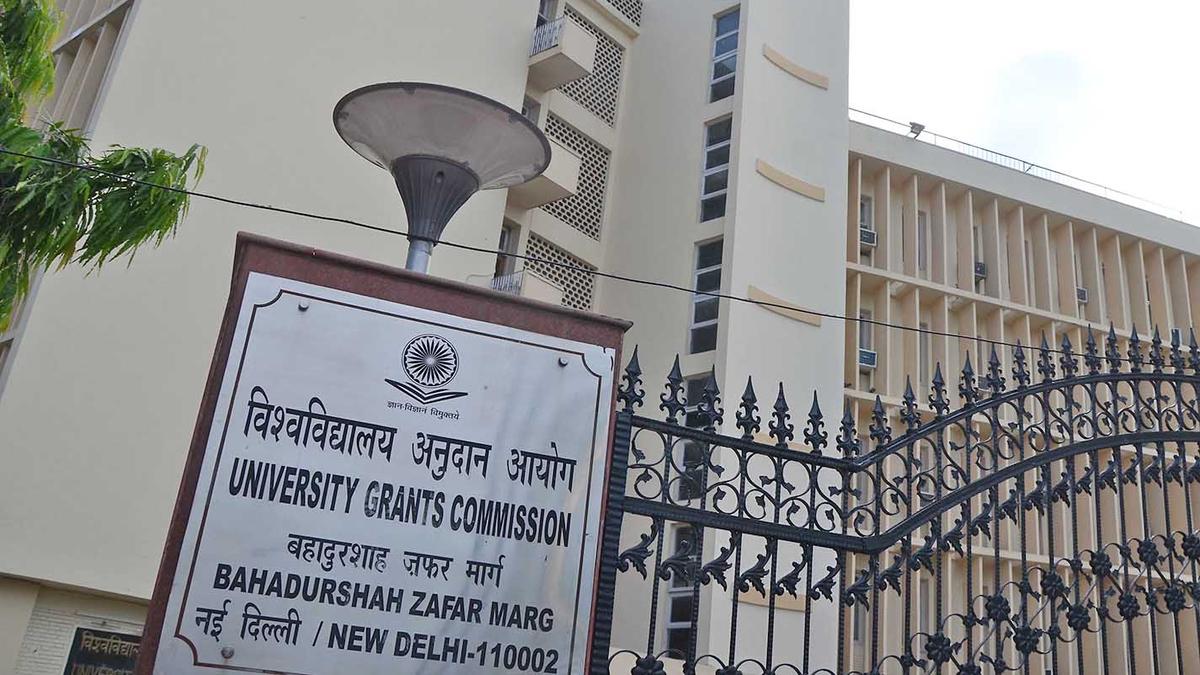The court was hearing a petition filed by the mothers of Rohith Vemula and Payal Tadvi, represented by senior advocate Indira Jaising and advocates Prasanna S. and Disha Wadekar, who had appealed to the Supreme Court to act against the “rampant” caste discrimination in universities which claimed their children’s lives. File.
| Photo Credit: Sushil Kumar Verma
The Union government informed the Supreme Court on Friday (February 28, 2025) that a new set of Regulations to wipe out discrimination, especially on the basis of religion or caste, will give the University Grants Commission (UGC) “teeth and power” to de-recognise non-compliant higher education institutions.
“Recognition will be cancelled if they do not comply,” Solicitor General Tushar Mehta, appearing for the Centre, informed a Bench headed by Justice Surya Kant.

The top law officer said the draft University Grants Commission (Promotion of Equity in Higher Education Institutions) Regulations of 2025 have already been published in the UGC website for inviting public comments and suggestions. Thereafter, it would be notified in accordance with law.
The court was hearing a petition filed by the mothers of Rohith Vemula and Payal Tadvi, represented by senior advocate Indira Jaising and advocates Prasanna S. and Disha Wadekar, who had appealed to the Supreme Court to act against the “rampant” caste discrimination in universities which claimed their children’s lives. Rohith Vemula, a PhD scholar at Hyderabad Central University, and Payal Tadvi, a tribal student of TN Topiwala National Medical College, died by suicide in January 2016 and May 2019, respectively, after being subject to on-campus caste bias.
The draft Regulations describe its objective as the eradication of discrimination on the basis of religion, race, sex, place of birth, or caste, particularly against the members of Scheduled Castes and Scheduled Tribes, socially and educationally backward classes, economically weaker sections, or any of them, and to promote full equity and inclusion amongst the stakeholders in higher education institutions (HEI).
If non-compliance is established, an HEI can be debarred from participating in UGC schemes or from offering degrees, open and distance learning and online programmes. The draft Regulations also give the UGC power to remove errant HEIs from the list of recognised universities maintained under Section 2(f) of the UGC Act, 1956. It has proposed the imposition of Section 12B (prohibition on the grant of funds to universities) on HEIs found unfit under the draft Regulations. The Regulations also allow the UGC to take “additional punitive actions” on a case-to-case basis.
Ms. Jaising said there have been at least 18 deaths by suicides in HEIs in the past 14 months. The level of compliance among many Central, State, deemed and private universities and institutions of higher learning to even set up Equal Opportunity Cells under the UGC (Promotion of Equity in Higher Educational Institutions) Regulations of 2012 had been dismal, she submitted.
Mr. Mehta said the draft Regulations of 2025 takes care of the lacuna by proposing ‘Equity Committees’ in HEIs with members drawn from civil society, students and faculty. The draft legislation showed one member to be a woman and one member each from the SC and ST category.
Justice Kant assured the apex court was dedicated to facilitating the creation of a robust mechanism to prevent and stop discrimination. “The deaths are unfortunate,” Justice Kant said.
“There have been violations. The compliance is low. Probably it may have been due to the lack of sufficient teeth and power for the UGC. Once UGC’s hands are strengthened, especially to cancel the recognition of HEIs, things will start moving in the right direction,” Justice Kant addressed Ms. Jaising.
Ms. Jaising said the IITs and IIMs and some of the national law schools had not even responded to a communication circulated by the UGC, on the basis of January 3 order of the court, seeking data on the Equal Opportunity Cells set up by HEIs, the number of complaints of discrimination received under them under the 2012 Regulations and the action taken on them.
The senior lawyer argued that 40% of the universities and 80% of colleges have not responded to the UGC.
The UGC, in an affidavit filed in court on Thursday, said it had received 3522 responses from 45 Central universities, 293 State universities, 269 private universities, 103 deemed-to-be universities and 2812 colleges. A total of 3067 Equal Opportunity Cells and 3273 SC/ST Cells were set up by these institutions.
“The number of total caste discrimination complaints received by these Cells so far is 1503,out of which 1426 complaints have been resolved,” the UGC informed the top court. It said 1314 complaints were received under the 2012 Regulations, out of which 1276 were resolved.
“We will not depend on the date from IITs and IIMs. We will find a way to collect the data on our own,” Justice Kant replied. The Bench indicated that once the Regulations are notified, the court would contemplate augmenting the responsibilities of the statutory body (UGC).
Mr. Mehta said the draft Regulations would be open for public opinion for a month. After which, the government would take a month to apply its mind to the suggestions received. Mr. Mehta asked for three months’ time before the next hearing. The Bench said it would take up the case after eight weeks.
Published – February 28, 2025 05:53 pm IST
